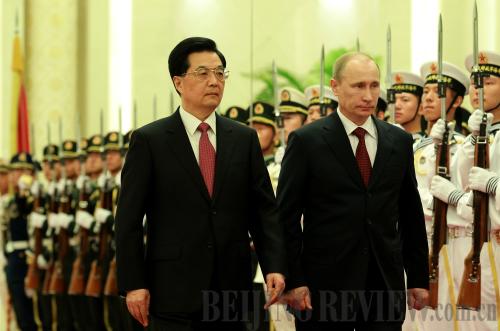|
 |
|
BILATERAL OCCASION: Chinese President Hu Jintao and his Russian counterpart Vladimir Putin review the guards of honor during a welcoming ceremony in Beijing on June 5. Putin arrived that day to attend the 12th SCO Summit and to pay a state visit to China (DING LIN) |
Sergey Luzyanin, Deputy Director of the Institute of Far Eastern Studies at the Russian Academy of Sciences, confirmed that this year's SCO Summit was very important. "The SCO faces a mission in the following 10 years, that is, how to improve its position in the region and the world and to play a bigger role," said Luzyanin. He concluded that during the past years, the SCO has been actively protecting peaceful development and stability in the region, and it can do more and better in the future.
SCO enlargement
At the Beijing summit, the SCO granted Afghanistan observer status and accepted Turkey as a dialogue partner. Their participation provokes a question: Should the SCO pursue enlargement? Observers said yes, but they don't think the enlargement should be conducted in a rush.
Lukin pointed out that enlargement will help the development of the SCO. He said five of the six member states aside from China are former Soviet Union nations. Putin has been ambitious on the integration of the Commonwealth of Independent States (CIS), and he will pay more attention to this point during his new presidential term. Somehow, the SCO has been combined with the CIS integration. "After enlargement, more non-CIS nations will be involved. Therefore, more SCO topics will be independent of CIS integration, which will quicken the SCO's pace of development," said Lukin.
Shi pointed out that Turkey applied to be a dialogue partner, based on the country's recent diplomatic strategy of turning east. He applauded the SCO's approval of Turkey's application. He said Turkey is a moderate Islamic nation, and Islam now is the biggest religion in the SCO. "Turkey's participation can neutralize the extremist Islamic influence in some SCO members," said Shi. Besides, he said since Turkey is a NATO member, its involvement might enhance exchanges with the NATO, while the SCO helps Turkey by opening a gate to the east.
Afghanistan is a problem for neighboring states, and its permanent stability depends on a transformation of its economic structure. Now unfortunately Afghanistan's economy relies on drug trafficking, Shi said. If SCO members can invest in Afghanistan's processing industry and agriculture, they will contribute to peace, stability and development in the country.
Guan Guihai, a professor and expert on Russian studies at Peking University, agreed that there are enough reasons for the SCO to consider enlargement. "If any organization has formed a stubborn formula of member states and pattern of activities, it will sooner or later be dead," he said. But he also suggested that the SCO should thoroughly study the situation before deciding when and how to enlarge. "For example, adding members will require more languages and more topics," he said.
Luzyanin also said the SCO needs to enlarge. But it doesn't mean that enlargement should start immediately, he stressed.
Luzyanin said Iran now is an SCO observer, but it is under UN sanctions. He said it is not proper for the SCO to absorb Iran as a formal member. Besides, India and Pakistan are both applying to be formal members, but neither of them hopes the other one will be an SCO member because of historical conflicts between them. Afghanistan's participation is also a sensitive issue, considering its future security problems, he said.
|
